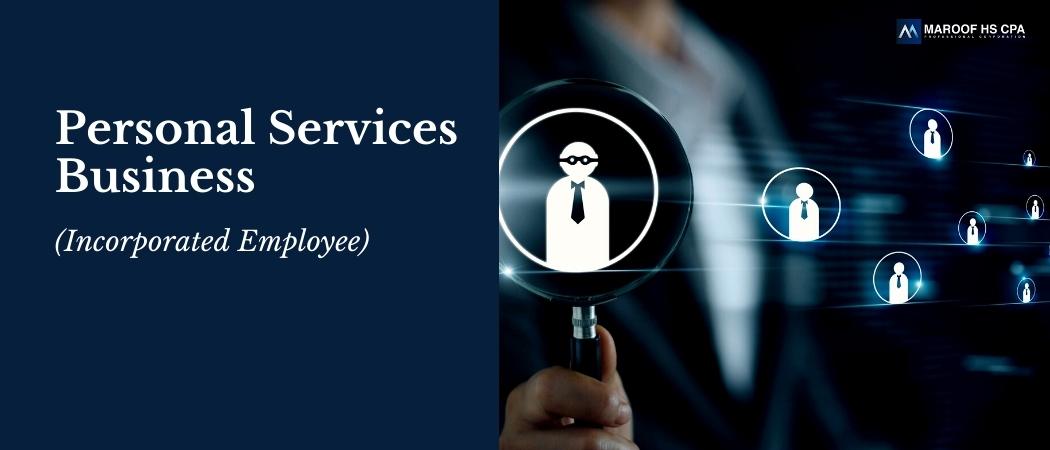Have you recently received a contract offer from a business that has asked you to incorporate yourself?
By the way, this is very trendy in the IT and transportation industry! We receive a couple of requests every day for such incorporations. Most of the time, because the “employer” (yes, the word used by these people) requires them to incorporate!
Incorporating a business in Canada is not difficult! This can be done as quickly as within few hours. However, there is something that a lot of contractors/ employees keep on ignoring i.e. Personal Services Business. Interestingly, sometimes, the Cornershop tax preparers do file the taxes for these corporations as a CCPC claiming the small business deduction along with many other ineligible expenses.
The employer does not have to remit the source deductions whereas the employee (incorporated employee) mistakenly enjoys lower tax rates and claims all sorts of deductions. At the same time, good accountants help the clients pocket additional savings using by incorrectly using CCPC tax rates. Everyone is happy!
Let’s have a look at the Personal Services Business (PSB) status of a corporation!
Caution: This post is for general information purposes only. The readers should not consider it as tax advice.
What is a Personal Services Business (PSB)?
A Personal Services Business or PSB is a corporation incorporated to provide employment-like services. There is nothing wrong with such incorporation, however, shareholders/incorporators need to know the tax implications involved.
Tax Implications for PSBs
There are three important tax implications for Corporations with PSB status:
1.Full Rate Taxable Income:
PSB cannot claim the small business deduction against its PSB income.
PSBs cannot use a 13.0% rate reduction at the federal level. The general corporate tax rate in Canada is 33.0% and after federal abatement of 10.0%, it stands at 28.0%. The PSB income of a corporation is subject to a 28.0% federal tax rate before an additional tax.
2. Additional Federal Tax on PSB Income
There is an additional corporate tax of 5% on the PSB income at the federal level. This increases the overall federal corporate income tax rate to 33.0%
3. Limited Income Tax Deductions are Allowed for PSBs
A corporation can, generally, deduct all the eligible expenses incurred to generate the business income. However, in the case of PSB, there are very limited deductions available. Below is the list of such available deductions:
- Salaries and wages paid to the incorporated employee, or any other remuneration paid. This includes employee source deductions and the costs of pension plans as well.
- Cost of benefits and allowances paid to the incorporated employee.
- If the incorporated employee was allowed to deduct the employment expenses had (s)he been not incorporated. Such as expenses connected to the selling of the property or contract negotiations.
- Legal expenses to collect the amounts due against the services provided.
Personal Services Business – Tax Rates
Corporate tax rates for Personal Services Business are below:
2020-2021 | Tax rates for PSB Income | Tax Rates for CCPC other Income |
| Federal: | ||
| General corporate rate | 38.00% | 38.00% |
| Federal abatement | -10 | -10 |
| General rate reduction | Not available for PSB | -13 |
| Additional tax rate | 5 | 0 |
| Total Federal | 33 | 15 |
| Provincial tax rate in Ontario (P) | 11.5 | 11.5 |
| Combined Federal & Provincial (F + P) | 44.50% | 26.50% |
How the PSB Status of a Corporation is determined?
Subsection 125(7) of the Income Tax Act (ITA) provides the definition of a PSB.
If a corporation has an “incorporated employee” it is a Personal Services Business. When a corporation has an incorporated employee two further tests need to be met (mentioned later on).
An incorporated employee provides services on behalf of the corporation. There is no requirement of share ownership. If an incorporated employee provides services, even if the shares are owned by another person related to the incorporated employee, the corporation is still a PSB.
Two Important tests include:
- Specified shareholder: If the incorporated employee is a specified shareholder of the corporation or not? Without going into details of specified shareholder, to put it simply if another person related to incorporated employee owns shares or not? Such a related person is a specified shareholder. So, even if the shares of a corporation are owned by, let’s say spouse, but services are performed by an incorporated employee, it is a PSB. Generally, these are non-arms length dealings.
- Reasonable to be regarded as an officer or employee: The second test for an incorporated employee is to determine if the relationship between the incorporated employee and the client (employer) is an employment or contractor relationship. In other words, coming down to the distinction between employees and independent contractors. If it is established that the relationship is of independent contractor nature, the corporation has an active business income (ABI) not PSB income.
Whether a corporation is carrying out a Personal Services Business or not is a fact-based assessment. Different factors that affect the determination of the status of an employee or independent contractor are also used to determine PSB status. Some of these factors are control, tools and equipment, subcontracting, financial risk, responsibility for investment and management, and an opportunity for profit.
Exceptions to PSB
There are two exceptions provided in the ITA where the corporation is not considered a PSB:
- If the corporation has more than five full-time employees (more to be emphasized) throughout the year. In such a case, the corporation is carrying out an active business even if the other tests for a PSB are met.
- If the income coming to the corporation as a result of the services provided by an incorporated employee is an associated corporation.
With regards to more than five full-time employees, if a corporation has five full-time employees only, the exception is not available. However, an extra part-time employee can help with getting this exemption.
Some Corporate Tax Tips for a Personal Services Business
So, if you incorporated yourself and have determined that you have PSB income in Corporation you can reduce the corporate tax burden:
Pay the Salary to Incorporated Employee
As mentioned above, very limited income tax deductions are available for corporations with PSB income. The best way to get out of the trap of substantially higher corporate income tax rates is to pay the salary to the incorporated employee. If the corporation has nil or a lower net income as a result of this deduction, the corporate taxes will be zero or lower too.
Many incorporated employees end up paying 2X of CPP; one at the corporation level and another one at a personal level. So, an otherwise attractive contract might not be as attractive. One of the reasons many businesses require corporations to sign the contracts is to avoid remitting source deductions and other employment-related costs such as vacation pay.
Seek an Advance Income Tax Ruling
PSB definition in subsection 125(7) is very expansive and difficult to circumvent. As mentioned above, Corporations with PSB income cannot deduct all the expenses as otherwise allowed for other CCPCs. Further, any reassessment can result in an exceptionally high tax liability. If you are dealing with this on your own, it is always better to seek an advance income tax ruling from CRA.
Driver Inc. – A Common Example of an Incorporated Employee
The transportation industry, long-haul trucking, in particular, seems to be full of Incorporated Employees. Instead of hiring truck drivers, transportation businesses often push the drivers to incorporate a business. There are many motivations behind this, for example, to avoid payroll contributions, overtime, meals or vacation pay payments. This industry is very much on the CRA’s radar.
IT Employees contracted as Corporations – Another Common Example of PSB
IT Sector is another sector that has a tendency of hiring contractors as corporations rather than employees.
If you are just offered a contract in the IT industry as a contractor and you are deciding whether to incorporate or not, conduct a factual analysis if you can be classified as an employee or not. If the facts point towards an employee relationship, you are going to earn PSB income in your corporation. The corporation is not a PSB if the facts point towards an independent contractor situation if the corporation had not existed.
Read an answer to a tax question of IT Contractor whether incorporation is better than employment.
It is always better to consult a professional corporate income tax accountant in case of such contracts to determine the correct tax consequences of these decisions.
Maroof HS CPA Professional Corporation is a CPA firm registered with CPA Ontario and CPA Alberta. We provide full-scale corporate income tax planning and preparation services in Canada. Get in touch with us.






2 thoughts on “Personal Services Business (Incorporated Employee)”
What’s the advantages of PSB over Inc?
hi Zohaib, there is no advantage of PSB at all. The whole purpose of PSB is to discourage employees from incorporating themselves. Also, you might be confusing “inc” and “PSB”. Inc. is simply an incorporated business that can be a PSB as well at the same time. PSB is a character of the income earned within a corporation, be it an inc, ltd, limited or whatsoever. Also, it is possible to have a PSB income and an active business income at the same time within same corporation.